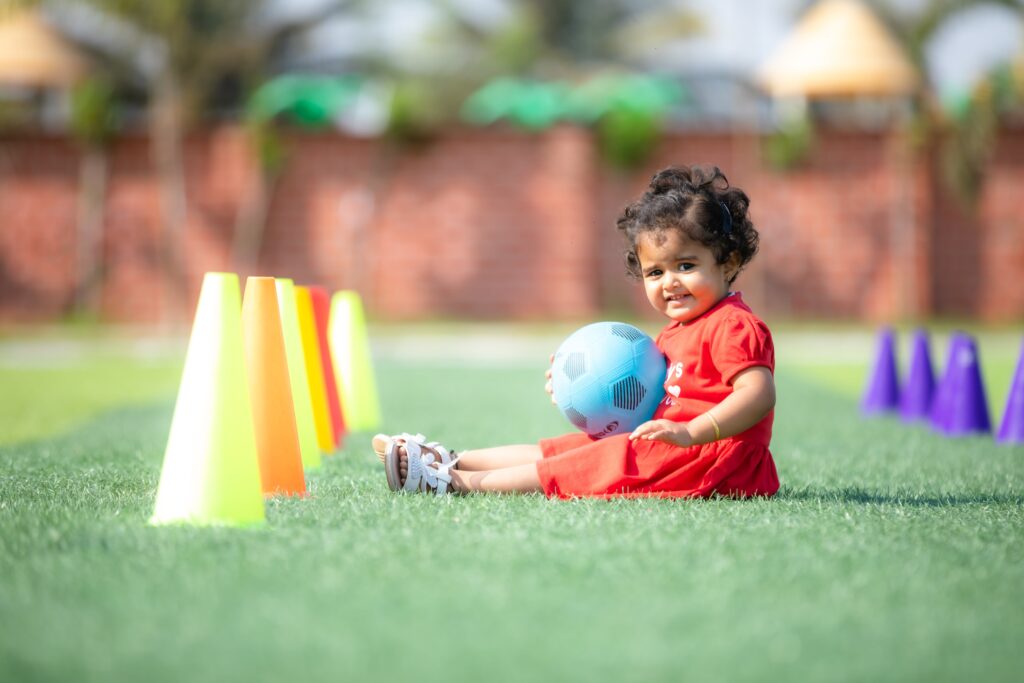6 Tips for Getting Toddlers and Preschoolers into Grassroots Football

If you’re hoping to nurture the next Lionel Messi into a life of professional football, the earlier you start, the better. Young children are like sponges: they absorb a huge amount of information and develop most of their motor skills before the age of five. The window of developmental opportunity is small, so getting them started early is essential.
Of course, with so many distractions around these days, getting toddlers and preschoolers into grassroots football is easier said than done. That’s why we’ve created a list of 6 proven tips for sparking a love of football in the hearts and minds of little ones up and down the country!
1. Make it Fun
Start with enjoyable activities introducing football to young children. It ensures that the sport is engaging and appealing to their budding interests. If you have young children, you’ll know that if it’s not fun, they simply won’t do it.
Football sessions for toddlers and preschoolers should focus on fun and play rather than rigorous training. Incorporating games like dribbling through cones, kicking into small football goals, and playing mini-matches with simplified rules can captivate their imagination and enthusiasm.
By prioritising enjoyment in the early stages, children are more likely to develop a positive association with football, making it rewarding when they embark on their grassroots football journey.
2. Create a Positive Football Environment
Creating a positive environment is crucial when you’re trying to nurture a child's love for football. There are a few ways everyone involved can contribute in this regard:
Parents
Parents play a vital role by showing enthusiasm and support for their child's interest in football. Encourage them to explore the sport without pressure, attend games and provide necessary football equipment, such as an appropriately sized football and a small popup football goal.
Coaches
Coaches should create a welcoming and inclusive atmosphere during training sessions. They must focus on skill development, teamwork and fun rather than solely on competition.
Peers
Positive interactions with fellow young players help create lasting memories and friendships. Encourage teamwork and cooperation among children, fostering a sense of belonging.
Feedback
Constructive feedback from parents and coaches should be delivered with encouragement and kindness — emphasising improvement rather than criticism.
Celebrate Efforts
Celebrate small achievements and milestones in the child's football journey, boosting their self-esteem and motivation.
3. Stock Up on Quality Football Equipment for Children
When engaging toddlers and preschoolers in football activities, it's vital to ensure their safety and provide the necessary equipment.
Appropriate Footwear: Ensure children wear comfortable, well-fitting trainers or football boots with non-slip soles to prevent slips and injuries.
Shin Guards: These protect the shins from impact during kicks and collisions. Choose shin guards specifically designed for young children.
Size-Appropriate Ball: Use smaller, lighter footballs suitable for their age and strength to prevent strain or mishandling. Start with nothing larger than a size 3 football to keep things simple and relatively easy.
Comfortable Sportswear: Dress them in breathable sportswear to keep them cool and comfortable during play.
Water Bottle: Hydration is crucial, especially during physical activities. Encourage children to drink water throughout the session.
Football Goal: A small, portable football will ensure you can enjoy impromptu football kickabouts wherever you are. A pop-up football goal, for example, is lightweight, portable and exceptionally easy to put up and fold away.
4. Age-Appropriate Training
Incorporating age-appropriate training sessions for young football enthusiasts is essential for their development. These tailored sessions offer several advantages:
Developmental Alignment
Age-appropriate training ensures that the activities and exercises are in sync with the child's physical and cognitive development. It avoids pushing them beyond their capabilities and minimises the risk of injury.
Skill Progression
Basic drills and exercises focus on fundamental skills like dribbling, passing and ball control. This gradual skill progression allows children to build a strong foundation for their football journey.
Enjoyment and Engagement
Training sessions tailored to their age group are more enjoyable and engaging for children. It keeps their interest alive and fosters a love for the sport.
5. Encourage Social Interaction
Team sports like football offer numerous social benefits for children — both physically and socially. These include:
Teamwork
Football encourages teamwork as players must cooperate to achieve common goals. Children learn to work together, share responsibilities and support their teammates.
Communication Skills
Effective communication is vital in football. Young players develop their verbal and non-verbal communication skills, which are valuable both on and off the pitch.
Friendship and Camaraderie
Team sports create opportunities for children to form lasting friendships and experience camaraderie. These bonds contribute to their social development and emotional well-being.
6. Be Patient and Supportive
Patience and support are key when introducing children to football. Learning new skills — and sometimes failing — can be a stressful experience for little ones. Remember the following points when you’re enjoying football with your child.
Learning Curve
Understand that every child learns the basics of football at their own pace. Be patient with their progress, and don't pressure them to achieve instant results.
Positive Reinforcement
Use positive reinforcement to boost their confidence and motivation. Celebrate their efforts and milestones, no matter how small.
Handling Challenges
Encourage children to view challenges and setbacks as learning opportunities. Teach them resilience and the value of perseverance in overcoming obstacles.
Just Have Fun
Grassroots football for toddlers and preschools should be pure joy. When it stops being fun, stop. But with persistence and the right approach, you’ll give your child the best possible chance of developing into a good player.

